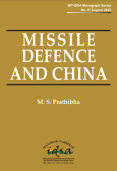What the Chinese White Paper Says on Diao Yu Dao? An Opportunity to Revisit the Issue
This Issue Brief presents the historical and legal debate surrounding the dispute and in the process underscores the inconsistencies and weaknesses in the Chinese claims.
- Prashant Kumar Singh
- October 10, 2012











